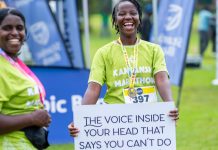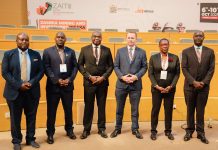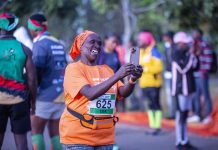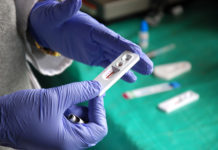Abigail has known that she was HIV positive for as long as she can remember. But that doesn’t mean the 19-year-old finds it easy to live with her status. In 2016, three years after joining the Integrated HIV/AIDS Programme at the Malcolm Watson Hospital — co-funded by Mopani Copper Mines Plc, Zambia’s government, and the Presidential Emergency Plan For AIDS Relief (PEPFAR) — she joined an adolescent support group, organised by the programme. Soon, she had become one of eight adolescents trained as mentors within a group of around 30 young men and women, all of whom are living with HIV.
Mining For Zambia spoke to Abigail — who was joined by Pastor John Imasiku, leader of the adolescent support group, and Memory Kachimbe, a key healthcare provider on the programme — about what makes the group so valuable to the community.
When did you first join the Integrated HIV/AIDS Programme at Malcolm Watson Hospital?
Abigail: I was transferred to this clinic in 2013 by my parents; they come here too. Before that, I was getting treatment at a government facility in Chingola. Now I only have to come once a year for review.
Memory explains: Those who are virally suppressed [like Abigail] may visit the hospital once a year for review. As long as they are okay with somebody going into their home to take them medication and check their general health status, then they can be on that programme. Those patients with other conditions or complications will still visit the hospital regularly for treatment. There are also those who prefer coming to the hospital, so we follow their preferences.
“In Zambia, I think we are one of the few hospitals that have started up a programme like this.”
Why did you decide to join this group?
Abigail: It’s a group where we exchange ideas and discuss things — like how to adhere to your medication. And how to make good decisions during difficult times… It’s very useful. We get to interact with a lot of people.
What are some of the activities you do?
All kinds of things, even sports: football, netball, basketball. I mostly like netball.
Pastor John, how did you get involved in leading this group?
Pastor John: I graduated from Bible college and thought that working with youth would be a good idea. Some youths still need to accept their [HIV] status. It is a challenge for them, and they need someone to help them to come out, so I decided to join this programme in 2016. We meet every last week of the month. There are a lot of activities: like sports, and even spiritual things.
Abigail, you’re one of eight young people in a group of around 30 who have been trained as a mentor. What made you interested in becoming a mentor?
Abigail: Sensitising the youth is very important. I can’t approach people who are older than me because it would be difficult for them to believe that I know what I’m talking about. But it’s very easy to teach my fellow youths because I know how to approach them.
Talking to young people about HIV/AIDS must be challenging. Do you sometimes disclose your status when you approach people of your age?
Sometimes I disclose it, but it depends.
You must be a very good people-person.
[She giggles bashfully.]
Pastor John, what have you learned from working with youth like Abigail?
Pastor John: They are very brave people. It is important to remember that they are also human beings who can do excellent things.

What do you enjoy about being a mentor?
Abigail: Being a mentor is a very good thing; it makes me feel helpful, and happy. Because I’ve got a passion for communication, people listen to me.
What are your plans for the next few years?
Abigail: I completed high school last year, and I want to study further — as soon as I can get sponsorship. I want to focus on my career.
Tell us more about your plans.
Abigail: I want to study nursing. It feels good helping people, and I think it’s the career for me. My aunt is a nurse, and she inspires me a lot.
Do you ever have challenges related to your status with people outside the group?
Abigail: I only ever disclose my status with friends in the [support] group.
What are the strengths of this programme?
Memory: This programme has really helped us understand young people socially, and made us more effective in giving relevant services to this special group of people. In the past, we treated these special young people as children, and at other times as adults. But they have their own individual needs. The adolescent support group has also assisted us in tailoring the information for their age-group, and their ways of understanding. For example, sexual education needs to be handled very differently when it comes to adults, adolescents, or children.
In Zambia, I think we are one of the few hospitals that have started up something like this. This programme has been a way for me, as a healthcare provider, to understand that these adolescents have their own views and opinions. They understand things from a very different perspective.
Pastor John: There are so many youths outside [Mufulira and Malcom Watson Hospital] who are living in denial and who haven’t yet accepted their status. We really want this programme to continue so that we can help many, many youth.
***
Abigail*, Memory, and Pastor John spoke to Mining For Zambia at the Malcolm Watson Hospital, one of the bases for the Integrated HIV/AIDS Programme, along with Wusakile Mine Hospital in Kitwe, and several satellite clinics.
In November 2007, Mopani Copper Mines (in partnership with the Catholic Relief Services and PEPFAR) opened up the programme to the general public. Today, approximately 10,000 clients are currently receiving Antiretroviral Treatment (ART), psycho-social counselling and – where clients’ viral load is sufficiently suppressed – deliveries of medication to their home by Community Health Workers.
*Name has been changed to protect the interviewee’s identity
See also: How one man’s attitude to his positive HIV status created positive change in his community

























